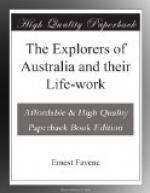Dr. Leichhardt appears to have been a man whose character, to judge from his short career, was largely composed of contradictions and inconsistencies. Eager for personal distinction, with high and noble aims, he yet lacked that ready sympathy and feeling of comradeship that attract men. Leichhardt’s followers never desired to accompany him on a second expedition. Yet strange to say, he was capable of inspiring firm friendship in such men as William Nicholson and Lieutenant Robert Lynd.
When he left on his first exploring expedition, on which he was successful owing to the luck of the novice, people generally predicted — and with much reason — that he would fail. But when he set out on his second and disastrous journey, universally applauded and with his name on everybody’s lips, it was never doubted but that he would succeed.
[Map. Leichhardt’s Route 1844 and 1845, Mitchell’s Route 1845 and 1846, and Kennedy’s Route 1847 and 1848]
On his first expedition he was insufficiently equipped, had but inexperienced men with him, and was a bad bushman himself. In fact the journal of the trip reads to a man accustomed to bush life like the fable of The Babes in the Wood; yet he managed to blunder through. On his second expedition he was amply provided, and most of his companions were experienced men, but it proved a miserable fiasco.
His great confidence in himself led him to ignore or undervalue the fact, patent to others, that he was no bushman either by instinct or training. And he seemed to prefer for companions men like himself, who could not detect this failing, as is evident from a letter written by him to W. Hull, of Melbourne, with reference to a young man who was anxious to join his party. In this letter he enumerates the qualities that he considers necessary in a follower:—
“Activity, good humour, sound moral principle, elasticity of mind and body, and perfect willingness to obey my orders, even though given harshly...I have been extremely unfortunate in the choice of my former companions.”
The last remark is an unworthy one, and of course applies to the companions of his second expedition. He does not include a knowledge of open-air life amongst his qualifications, nor the needful bushmanship; and apparently in Leichhardt’s opinion, a useless man of good moral principle would be as acceptable to an explorer as a good bushman of doubtful morality. It causes one to inquire whether the devoted men who toiled for Sturt, private soldiers and prisoners of the Crown, were men of sound moral principle? This extract affords an insight into Leichhardt’s failures. He wanted only those men who would blindly and ignorantly obey and believe in him. For a man of Leichhardt’s temperament, such men were not to be found: he had missed the fairy gift at birth — all the essentials of good leadership.




